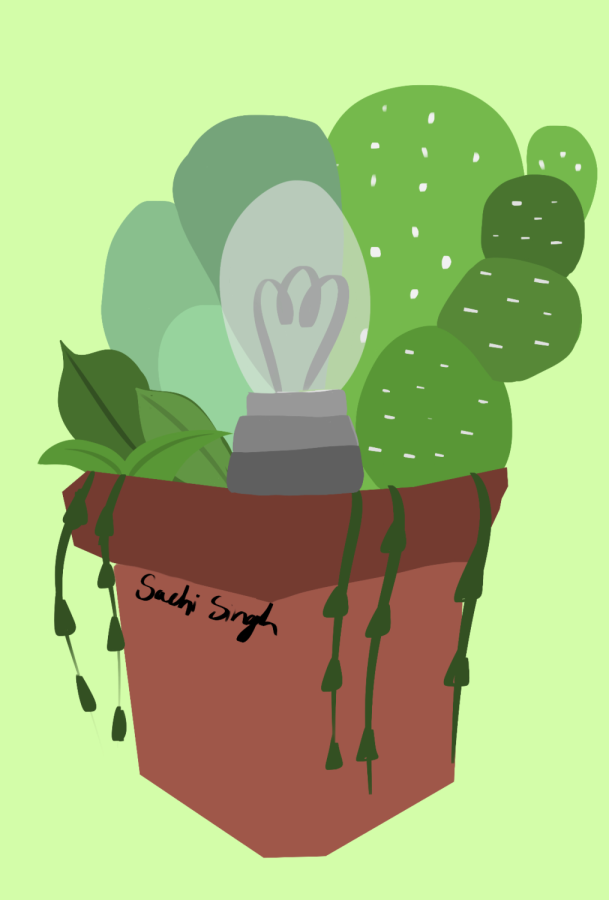Plants: The Root of Productivity
February 16, 2023
Guilt. Anxiety. Fear. These feelings consume your thoughts as you trudge home from school, feeling drained from the day. All you want to do is scroll on your phone and watch your favorite television show, which you proceed to do… for the whole afternoon. By the time five o’clock rolls around, you have yet to start your homework. Panic rising in your chest, you look around for a place to work, away from distractions. Suddenly, you realize that working in your living room might keep you on task. When you walk in, you are immediately drawn to the calming atmosphere, filled with lush indoor plants and natural light streaming through the windows. You start diligently working on your math problems, as you very seldom do. With newfound motivation, you finish the homework quickly and take a moment to appreciate the beauty of the room. With a smile, you leave the living room to enjoy the rest of your evening, feeling accomplished.
If you ever wondered why you felt more productive in a plant-filled environment, it was most likely because the plants made you feel more productive towards the task you had to complete. But why is that? How does being surrounded by leaves help ward off missing assignments?
Interestingly, the scientific reason behind this is that humans are known to have an innate desire hardwired into our DNA to deeply connect with nature, said Kara Rogers, a senior editor of biomedical sciences at Encyclopædia Britannica. This concept is called biophilia, which explains why humans have an instinctive fondness for the natural environment; it likely came from the human species evolving in close proximity to nature. The connection to nature is essential, as it benefits an individual by reducing stress and improving their overall well-being. Also, it can help to boost creativity, focus, and concentration. For instance, workplaces that incorporate biophilic design elements, such as indoor plants and natural light, improve productivity. Moreover, indoor plants provide fresh air to an individual, preventing fatigue and headaches, as well as fighting feelings of suffocation, allowing one to concentrate. Plants can also act as sound barriers by absorbing sound waves, which reduces the noise level in a room. Large plants and trees can be nature’s headphones, while smaller plants can be used to block out higher frequencies as stated by Joel Lerner from the Washington Post.
Having an aesthetic room, clothing style, or pictures is equivalent to having a visually-pleasing appearance. The term “aesthetic” has become increasingly popular over the years, as people become more aware of the effects on productivity that come with creating a visually pleasing environment. This is especially true in the workplace, where the aesthetics of the space can have a huge impact on the productivity and morale of employees. With an organized space comes a wider capability to think better and freely, resulting in increased motivation to complete an assignment. Environment matters. For example, the color green is known to reduce stress as well as make a person more focused. In fact, green rooms, which are used for theatrical performances or a place to wait in, were first developed to calm people who were about to go on stage to perform or alleviate a potentially tense atmosphere in a business-related meeting.
Studies have shown that adding plants is a great way to stimulate creativity and productivity in a workplace or any setting. On the contrary, there are some plants that one may want to avoid as they can cause discomfort while trying to be productive. The venus flytrap or any plant that is on the verge of death can have a negative impact on an individual’s physical and mental well-being. The venus fly trap causes stress levels to increase instead of decreasing them and contains an unpleasant odor, which could harm more than help you while you are completing geometry homework. If any plant is dying, it can have a detrimental effect on one’s mental well-being as the plant is not able to provide fresh air and reflects a trite and dull mood. Instead, turn to plants that can positively impact your studying habits like the areca palm, peace lily, and money plant as they all generate fresh air, which can help you clear your head.
In the future, seeing the significance and effect of having plants influence an individual’s productivity, it would be likely to see plants more often in workspaces and classrooms. Meanwhile, having more plants would mean that they eliminate air pollutants and provide fresh air, benefiting the environment and humans. So, next time if you don’t feel motivated enough to do your work or homework, touch some grass to see if plants have a positive impact on your productivity!








































